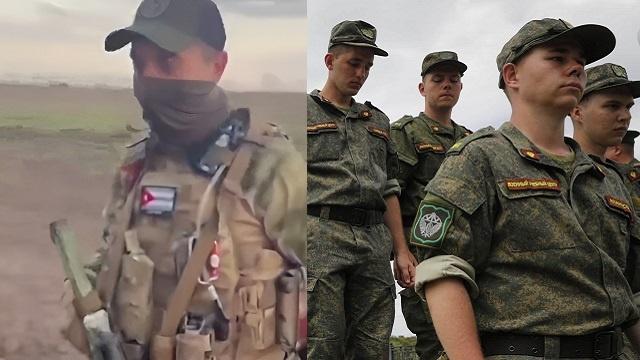 Why Are Cubans Going to Ukraine?
Why Are Cubans Going to Ukraine?
Cuban soldiers and conscripts are officially present in the Eurasian region. Their mission is customary, given the role Cuban communism has played since 1959. On this occasion, because of Russia’s unlawful and immoral invasion of Ukraine, they are providing cannon fodder to the Putin regime. While this should come as no surprise, it is important that the West and, particularly, the United States fully grasp the implications of Cuban mercenaryism in this genocide against Ukraine.
From day one, Communist Cuba, as a committed Marxist-Leninist state, has enthusiastically engaged itself in global wars and terrorist campaigns. Many of these armed conflicts and subversive operations, which sought to overthrow legitimate governments or help Marxist regimes remain in power, were aided and intellectually enabled wholly by Havana. There are reasons that explain this pattern of behavior. Some have attributed this adventurism that has cost thousands of lives, including those of Cubans as well as those of Latin Americans, Africans, Asians, and Americans (and others), to principled ideological commitments. Under the guise of “liberation,” communist Cubans have indisputably waged brutal warfare for what they labeled as decolonization, anti-imperialism, anti-racism, anti-capitalism, etc.
The logic behind Cuban communism's obsession with international meddling has been strategic, reactive, and fundamentally innate to its survival goals. Cuba’s most important asset, since coming under Marxist rule, is its willingness to involve itself in other countries' affairs. This active engagement in sociopolitical disruption strategies, and/or socialist solidarity, has established a place for communist Cuba at the table of global players. This proclivity, exercised also in the intelligence sphere, has immensely added to the stock of influence the communists on the island wield. Cuba does not possess highly sought-after natural resources. As far as industrial and technological production, the Castro regime has rolled back the clock in some respects to the colonial era when held accountable on a historical comparative basis. What it does have is real estate. Its proximity to the United States has made the island a commodity for the world’s evildoers.
Fidel Castro was a mass murderer, but he was not stupid and understood geography, the tendency of democracies to be sensitive to the development of a crisis given election patterns, and the necessity to forge deep-seated ties with influential countries. Latin America, Africa, Asia, and the Middle East witnessed the presence of Cuban troops and/or military personnel, not just for spreading or preserving communism. Blood, intelligence, logistical, and tactical support have been expendable items used as investments, always eyeing regime longevity. Castro-Communism has been like a small-time hood with flaunted bravura, which has utilized this mystique to amplify the protection of grander mobsters.
With a comprehensive network of repressive tools, merciless state terror, and the structure of a well-groomed totalitarian regime, the Cuban dictatorship has been able to retard its decay. However, understanding well the overarching importance of international factors in determining non-democratic regime durability, Castro-Communism, from the beginning, used its war and terror-generating capacity as leverage for its survival. For a short while, the United States did appear to understand the threat that a hyperactive Marxist-Leninist regime 90 miles from its shore represented and act accordingly. However, John F. Kennedy’s treacherous reversal at the Bay of Pigs and the infamous Kennedy-Khrushchev Pact, assuring American neutrality and the policing of armed Cuban exile liberation attempts, emboldened the communist dictatorship’s internationalist missions. It was the green light that signaled the establishment of a failed American policy of tolerating a headquarters for a wide range of subversive and deviant activities detrimental to the West and, especially, the United States.
Its ability to reject neutralism, develop a trajectory of ideologically based bellicose activism, and avoid systemically challenging repercussions from the leader of the Free World has given the Cuban dictatorship many things it needed to last in power. It has won favors and concessions from countries like the USSR/Russia, China, Iran, North Korea, quasi-colonies like Venezuela, Nicaragua, and Bolivia, and leftist revolutionary governments and movements worldwide. At the same time, Cuban communism discovered that its brazen violations of uncivilized conduct were not met with serious, discordant policies. To the contrary, Cuban imperialism has managed to intimidate democratic governments and their financial institutions, who have been genuflecting and accepting key moral aberrations like Cuba’s systematic crimes against humanity and support for acts of terror, in addition to its involvement in drug trafficking. Instead of punishing Havana’s criminal behavior, the West has rewarded it with credit, investments, grants, debt pardons, and a respected seat in international forums.
During the 1970s, when the Cuban regime was overtly involved in gross warfare in numerous countries on the African and American continents, the United States placated the Marxist dictatorship with concessions and recognition. Gerald Ford, in 1975, eased the U.S. embargo against the Castro government, allowing American subsidiaries to trade with Cuba. In 1977, Jimmy Carter eased travel to the island and opened interest sections in Havana and Washington, the prelude to the re-establishment of relations. The belligerent activity of Castro-Communism was rewarded for its bloody interventionist undertakings.
Communist Cuba is a member of the Eurasian Union. This political and economic structural alliance, which was established in 2015, includes Russia, Belarus, Kazakhstan, Kyrgyzstan, Armenia, and, as observer members, Moldova and Uzbekistan. It is a parallel group patterned after the European Union. The Cuban regime is a staunch ally of the Russian dictatorship. The Cuban-Russian espionage network is well-defined. “Havana Syndrome” has been one of its pet projects. Putin’s banks have served as one of the island’s most active money laundering and sanctions-evading mechanisms. It was to be expected that the Castroite military would show up at some point, headed for Ukraine.
The Cuban communists do not believe in charity work. Putin will, no doubt, remunerate Havana handsomely for the blood of its subjects. In addition to probably skimming between 75 and 92% of whatever Russia pays, they know this will bond them tighter with Putin and, consequently, China, a key Russian ally. Since the United States and European Union have adopted morally impotent dispositions regarding Cuba’s not-so-secret ties to Putinism, the Cuban dictatorship will confirm the sterileness of freedom-seeking policies supported by Washington. Everywhere democracy is threatened, you can bet Castro-Communism will be present in some fashion. If the United States truly believes it leads the Free World and wants to rid itself of a major problem for its national security, it must help topple the egregious six-decade-long dictatorship on the south side of the Florida Straits.
© The CubanAmerican Voice. All rights reserved.
 🖋️Author Julio M. Shiling
🖋️Author Julio M. Shiling
Julio M. Shiling is a political scientist, writer, columnist, lecturer, media commentator, and director of Patria de Martí and The CubanAmerican Voice. He holds a master’s degree in Political Science from Florida International University (FIU) in Miami, Florida. He is a member of The American Political Science Association, The PEN Club (Cuban Writers in Exile Chapter) and the Academy of Cuban History in Exile.
Follow Julio on:
📚Published books 📺In the media 👨🏫 Conferences and Symposiums 🎙️Podcast The Shiling Summary

